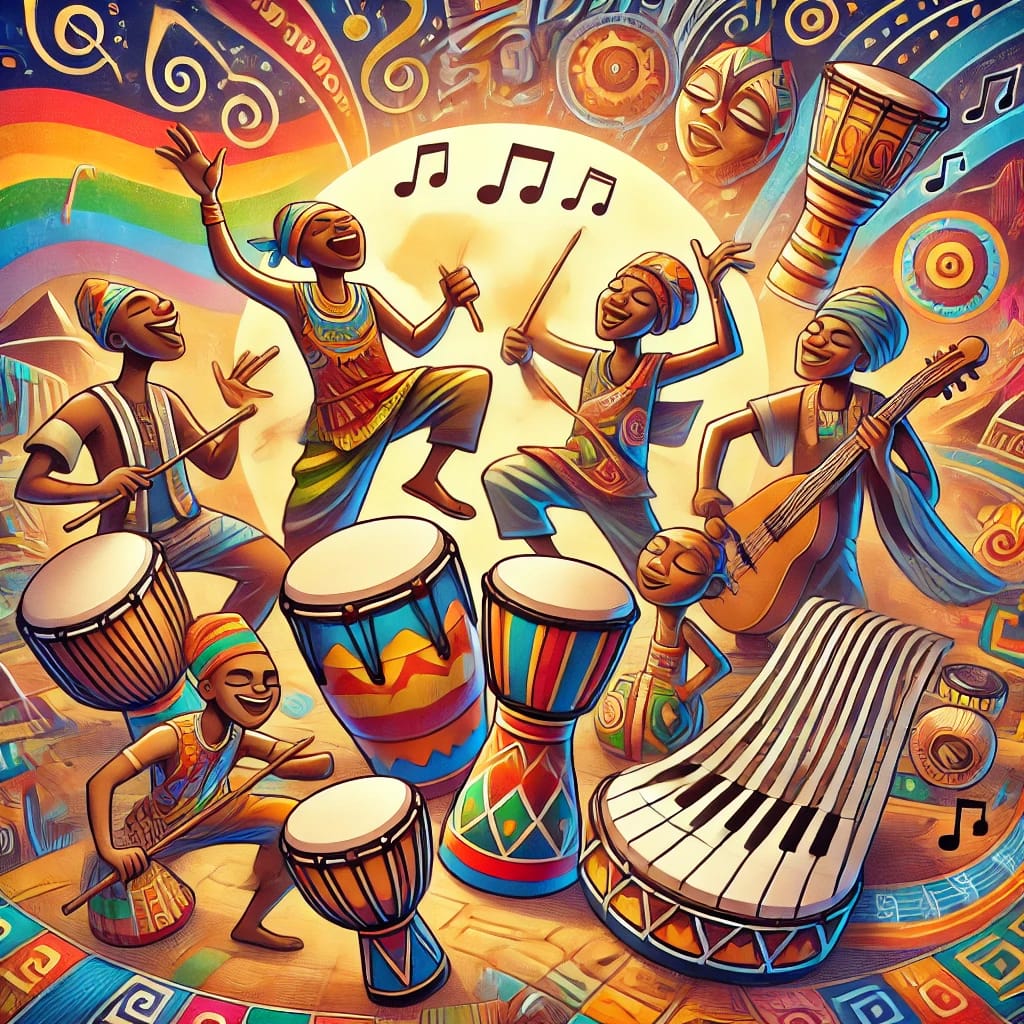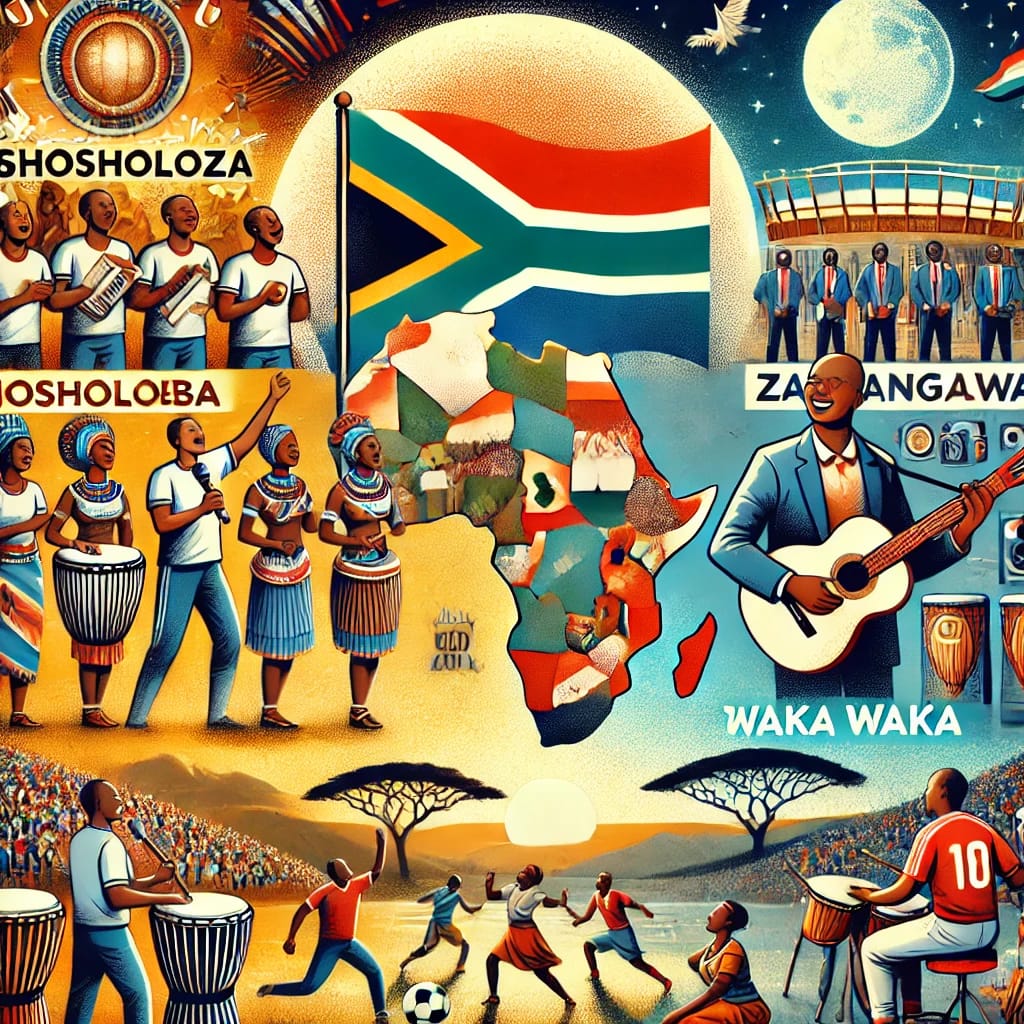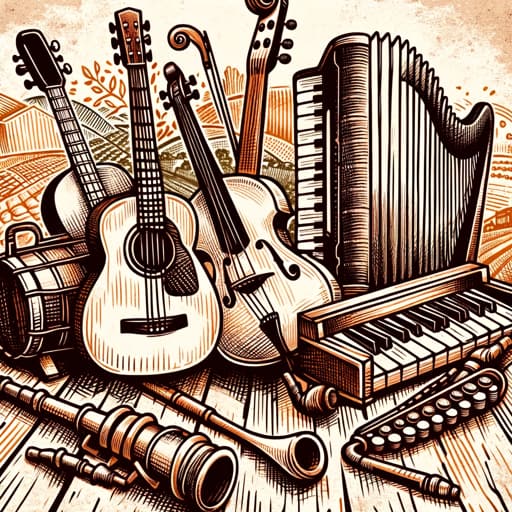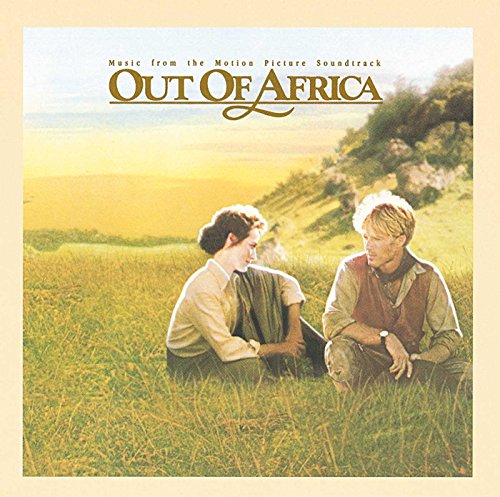
5 Iconic African Songs That Shaped World Music with Iconic Sounds
Africa’s musical heritage is one of the richest and most diverse in the world, spanning thousands of years, countless cultures, and a vast array of musical styles. From the rhythmic beats of drums to the melodic harmonies of traditional choirs, African music has left an indelible mark on global music. Some of the continent’s most iconic songs have transcended borders, influencing genres as varied as jazz, rock, pop, and hip-hop. In this article, we explore the top 5 African songs that not only captured the hearts of millions but also helped shape the sound of modern music around the world. These timeless tunes carry with them the spirit, resilience, and creativity of Africa, resonating in stadiums, concert halls, and radios across the globe.
These songs are not just iconic; they are the heartbeat of African culture, echoing the iconic sounds that have influenced generations.
Top 5 Folklore Songs of Africa
Origins, Cultural Impact, and Performers
Each of these iconic songs tells a story, reflecting the struggles, joys, and iconic aspects of life in Africa.
Africa’s musical landscape is diverse, representing a broad spectrum of cultures, languages, and traditions. Folk songs, deeply rooted in the continent’s history, serve as windows into the social, political, and spiritual lives of its people. Whether emerging from labor movements, spiritual practices, or communal celebrations, these songs often transcend borders and become anthems that unite people. Here, we explore five iconic folklore songs from Africa, examining their origins, cultural significance, and notable performers.
This iconic anthem connects South Africans and showcases the iconic resilience of their people.
1. “Shosholoza” – South Africa’s Anthem of Hope and Resilience
Its iconic lyrics resonate with everyone who has faced adversity and strives for hope.
“Shosholoza” is one of South Africa’s most beloved traditional songs, deeply intertwined with the country’s history of migration and labor. The song’s roots trace back to the late 19th and early 20th centuries when black South Africans were forced to migrate to work in the gold and diamond mines. Sung in the Ndebele and Zulu languages, “Shosholoza” means “go forward” or “push forward” and is often described as a song of encouragement.
This iconic song is a testament to the power of music in bringing people together.
Its iconic message of unity and strength is felt across the globe.
Origins
“Shosholoza” began as a work song, often sung by workers to keep a steady rhythm while toiling in the mines. The lyrics describe the sight of a steam train moving through the mountains, symbolizing the workers’ journey from Zimbabwe (then Rhodesia) to South Africa. Over time, the song took on deeper meaning, representing the struggles of apartheid and the resilience of migrant workers who were far from their homes.
The iconic sound of this song has inspired countless artists worldwide.
Cultural Significance
During the apartheid era, “Shosholoza” became more than just a mining song; it transformed into a symbol of solidarity and resistance. It was sung during protests, at political rallies, and eventually during South Africa’s transition to democracy. Even Nelson Mandela remarked on its significance, having sung it alongside his fellow inmates during his imprisonment on Robben Island.
Notable Performers
Today, “Shosholoza” is widely performed by choirs and has been recorded by notable South African musicians, including Ladysmith Black Mambazo. The song is also sung at sporting events, particularly rugby and soccer matches, where it serves as an anthem for unity and hope.
This iconic song resonates with audiences worldwide, capturing the spirit of Africa.
2. “Siyahamba” – A March Toward Freedom and Faith
“Siyahamba” is another traditional South African song, predominantly sung in the Zulu language. The song, which translates to “We are marching,” is a popular hymn in religious and cultural contexts. Its simple, yet powerful lyrics capture the essence of a collective movement toward a better future, making it a favorite in churches, schools, and even global peace rallies.
Origins
“Siyahamba” is believed to have originated in the early 20th century within South African Christian communities. Although its exact origin is unclear, it gained widespread popularity during the apartheid era as part of the liberation struggle, much like “Shosholoza.” The song reflects the deep connection between South African spiritual life and the fight for freedom.
Cultural Significance
The song is not only a spiritual anthem but also a symbol of unity and collective action. Its message of moving forward “in the light of God” has made it a central part of church services and religious celebrations, particularly within Protestant and Catholic denominations. In post-apartheid South Africa, “Siyahamba” continues to represent peace and the shared hope for a brighter future.
Its iconic rhythm is celebrated at festivals and gatherings everywhere.
This iconic song reinforces the bond of African culture through its vibrant and iconic sound.
It captures the iconic essence of African spirit and creativity.
Notable Performers
“Siyahamba” has been performed by numerous choirs around the world, including the Drakensberg Boys’ Choir and Soweto Gospel Choir. Internationally, it is frequently sung by church groups, and it is often featured in multicultural concerts and events promoting global peace.
3. “Zangalewa” – Cameroonian Song Celebrating Life
Its iconic status has made it a defining anthem for many.
This iconic melody will forever echo in the hearts of those who cherish African music.
“Zangalewa,” also known as “Zamina mina,” is a lively and joyful song from Cameroon that has captured the hearts of listeners across Africa and beyond. It was originally performed by the Cameroonian band Golden Sounds, which later renamed itself Zangalewa after the song’s popularity skyrocketed.
Origins
The song was first released in 1986 by Golden Sounds, a group composed of former members of the Cameroonian military. The lyrics, a mix of Pidgin English and local Cameroonian languages, are playful and often humorous, referencing military life and camaraderie. The title “Zangalewa” is a call to action, often used to rally soldiers or groups during times of celebration or work.
Cultural Significance
“Zangalewa” gained massive popularity throughout Africa due to its infectious rhythm and catchy lyrics. The song became a marching anthem for African soldiers, scouts, and even sports teams. Its high-energy beat and playful nature make it a favorite during football matches, parades, and public celebrations. In many ways, “Zangalewa” reflects the joy and resilience of the African spirit, even in the face of hardship.
Notable Performers
While Golden Sounds remains the original performer, the song has been covered and adapted by various artists over the years. It became a global hit when it was reinterpreted by Colombian pop star Shakira for the 2010 FIFA World Cup under the title “Waka Waka (This Time for Africa),” bringing “Zangalewa” to international fame.
These iconic adaptations show the influence of African music on global culture.
Such renditions prove the iconic versatility of African sounds and rhythms.
4. “Waka Waka (This Time for Africa)” – Global Anthem with African Roots
“Waka Waka (This Time for Africa)” is a modern adaptation of the Cameroonian song “Zangalewa,” made famous by Shakira during the 2010 FIFA World Cup, which was hosted by South Africa. This lively and upbeat song merges traditional African rhythms with contemporary pop, creating a global anthem that celebrates African culture and unity.
Origins
“Waka Waka” is directly inspired by “Zangalewa” and incorporates many of the original’s musical elements and lyrics. Shakira, in collaboration with the South African band Freshlyground, reworked the song to fit the global stage of the World Cup. Its chorus—”Waka waka eh eh, Zamina mina zangalewa“—comes straight from the Golden Sounds’ original hit.
Cultural Significance
As the official song of the 2010 FIFA World Cup, “Waka Waka” became an anthem for African pride and global unity. It was performed at the tournament’s opening and closing ceremonies, marking the first time the World Cup was held on African soil. The song’s vibrant energy and celebratory message resonated with football fans worldwide, and it remains a beloved tune in Africa and beyond.
Notable Performers
Shakira’s version of the song, featuring Freshlyground, catapulted “Waka Waka” to global stardom. Freshlyground, a South African band known for blending traditional African music with contemporary genres, added an authentic African flavor to the track. The song has since become one of the best-selling singles of all time, with over 10 million copies sold worldwide.
5. “Dancing in the Moonlight” – African Covers of a Global Hit
“Dancing in the Moonlight” is a song that originally became popular in the Western world, first released by the French-American band King Harvest in 1972. While it is not an African folk song in origin, it has been embraced and reinterpreted by African musicians, blending traditional African rhythms and sounds with contemporary pop music.
Origins
The original version of “Dancing in the Moonlight” was a feel-good track that spoke of carefree joy and dancing under the stars. Its infectious melody and upbeat rhythm have made it a timeless hit, often covered by various artists across different genres. In Africa, the song has been adapted by musicians who infused it with Afrobeat, highlife, and other regional musical styles.
Cultural Significance
The African covers of “Dancing in the Moonlight” reflect the continent’s ability to take global music and make it uniquely its own. By incorporating African instruments, rhythms, and languages, these versions bring a new life to the song while keeping its original spirit of joy and celebration.
Notable Performers
Several African artists have covered “Dancing in the Moonlight,” including Nigerian Afrobeat and highlife bands. These adaptations often blend the song with traditional African percussion, vocal harmonies, and instrumentation, giving it a distinctly African feel while retaining its universal appeal.
These five songs represent a small but vibrant portion of Africa’s vast musical heritage. From the resilience of “Shosholoza” to the joyful rhythm of “Zangalewa” and the global celebration brought by “Waka Waka,” each song tells a unique story. African music, with its deep roots and global reach, continues to inspire and bring people together across the world. Whether through traditional hymns or modern pop adaptations, the spirit of Africa’s folklore lives on in these unforgettable melodies.

The Global Influence of African Music
African music has had a profound and far-reaching influence on world music, shaping numerous genres, styles, and rhythmic structures across continents. The continent’s diverse musical traditions, instruments, and rhythms have not only enriched its own cultural tapestry but have also played a pivotal role in the development of modern music around the world. From jazz and blues in America to reggae and salsa in the Caribbean, African musical elements are deeply embedded in the fabric of global music. In this extended exploration, we will trace the key influences of African music on various genres, highlighting its pervasive legacy and ongoing impact.
1. African Rhythms and Percussion in Global Music
Rhythm is at the heart of African music, and its complex, layered percussive patterns have influenced a wide range of musical traditions worldwide. African drumming, particularly polyrhythms (the use of multiple rhythms played simultaneously), has been a key export to other cultures. Many Western genres that emphasize rhythm and groove owe their origins to African drumming techniques.
- Jazz and Blues: African rhythms heavily influenced the development of jazz and blues in the United States, both of which emerged from African-American communities in the early 20th century. The call-and-response patterns, improvisational techniques, and syncopated rhythms in these genres can be traced back to African musical traditions brought to the Americas by enslaved Africans.
- Latin Music: African slaves brought to Latin America contributed significantly to the rhythmic structures found in salsa, rumba, samba, and other Latin American genres. The Cuban “clave” rhythm, for example, is central to many forms of Latin music and has clear African origins.
- Rock and Roll: Early rock and roll drew from blues and rhythm and blues, both of which were deeply influenced by African musical elements. The use of backbeat (emphasis on the second and fourth beats) and the energetic, syncopated rhythms that drive rock music today can be traced back to African patterns.
2. Call and Response Tradition
Call and response is a musical structure in which one musical phrase (the “call“) is answered by another (the “response“). This form of musical dialogue is central to African music and has been adopted into various global genres. It is commonly used in African religious ceremonies, communal songs, and work songs.
- Gospel Music: The call-and-response style became a hallmark of African-American gospel music, influencing religious music across the world. This technique allows for both individual expression and communal participation, creating an interactive and emotionally powerful musical experience.
- Blues and Soul: Many blues songs use the call-and-response pattern, where a singer’s line is answered by a guitar riff or other instrumental phrase. This technique later transitioned into soul music, where vocalists and backing choirs would engage in a musical conversation, giving soul its distinct emotional depth.
- Hip-Hop: African call-and-response techniques have also shaped hip-hop, particularly in live performances and crowd engagement. Rappers often interact with their audience using these patterns, which has become a defining feature of hip-hop concerts.
3. African Melodies and Harmonic Structures
Although African music is primarily rhythm-driven, African melodic traditions, especially those utilizing pentatonic (five-note) scales, have also influenced global music. Many African cultures emphasize cyclical and repetitive melodies, which has impacted various musical forms around the world.
- Blues and Pentatonic Scales: The pentatonic scale, commonly used in African music, became a foundational element of blues music. This scale, characterized by its simplicity and emotional expressiveness, is central to both blues and rock guitar solos, creating a direct link between African music and the evolution of Western popular music.
- Reggae and Ska: Jamaican music, particularly reggae and ska, draws on African melodic traditions. Reggae’s emphasis on offbeat rhythms and its melodic phrasing can be traced to African musical structures brought to the Caribbean through the transatlantic slave trade.
4. Influence on Modern Popular Music
In the 20th and 21st centuries, African music’s influence on popular music became more explicit with the emergence of genres such as Afrobeat, highlife, and kwaito, which have not only dominated African music scenes but have also gained popularity globally.
Let us celebrate the iconic legacy of these powerful songs.
- Afrobeat: Pioneered by Nigerian musician Fela Kuti in the 1970s, Afrobeat blends traditional African rhythms with jazz, funk, and highlife, creating a sound that has captivated audiences worldwide. Its infectious rhythms and politically charged lyrics have inspired global artists, including contemporary musicians such as Beyoncé, Drake, and Burna Boy.
- Afrobeats: A modern iteration of Afrobeat, Afrobeats is a West African genre that incorporates electronic beats, hip-hop, and dancehall influences. Artists like Wizkid, Davido, and Tiwa Savage have popularized Afrobeats on a global scale, with the genre becoming a dominant force in both African and international music markets.
- Hip-Hop and Pop Music: African musical elements have been embraced by mainstream pop and hip-hop artists. In recent years, international pop stars such as Rihanna and Beyoncé have incorporated African rhythms, instruments, and visual aesthetics into their work. Beyoncé’s 2019 album The Lion King: The Gift is a prime example, as it featured collaborations with African artists such as Burna Boy, Yemi Alade, and Shatta Wale, blending African and Western sounds.
5. The Role of African Diaspora in Shaping Global Music
Keep the spirit of these iconic melodies alive as we dance for peace!
The African diaspora, particularly in the Americas and the Caribbean, has been a powerful conduit for the spread of African musical traditions. Enslaved Africans brought their musical heritage with them to the New World, where it blended with indigenous and European traditions, giving rise to new genres that reflect this rich fusion.
- Caribbean Music: Genres like reggae, calypso, and soca in the Caribbean are heavily influenced by African rhythms and melodies. Reggae, in particular, with its roots in African drumming and call-and-response, became a global phenomenon through the music of artists like Bob Marley, spreading messages of resistance, freedom, and unity.
- Brazilian Music: Samba, bossa nova, and other Brazilian music styles are deeply rooted in African traditions. The “samba de roda,” a traditional form of samba, originated in the Afro-Brazilian communities of Bahia, combining African drumming and dance with Portuguese influences. Today, samba is celebrated worldwide as one of Brazil’s most iconic cultural exports.
6. The Role of African Instruments in Global Music
Traditional African instruments have also left their mark on global music. Instruments such as the djembe, talking drum, kora, and mbira have been incorporated into a wide variety of musical genres outside of Africa, adding unique textures and rhythms to modern compositions.
- Djembe: The djembe, a West African drum, is widely used in world music and has become a popular instrument for drum circles, workshops, and performances globally. Its wide tonal range and dynamic capabilities make it a favorite for percussionists in diverse musical settings.
- Kora: The kora, a 21-string lute-bridge-harp from West Africa, has been embraced by musicians worldwide. Its ethereal sound can be heard in collaborations with Western classical music, jazz, and even modern pop. Kora virtuosos such as Toumani Diabaté have performed and recorded with international artists, further promoting the instrument’s global reach.
7. Cultural and Political Impact of African Music Globally
Beyond its musical influence, African music has also played a crucial role in shaping global cultural and political movements. African liberation songs, such as those from the apartheid era, have inspired anti-colonial and civil rights movements around the world.
- Civil Rights Movement: The African-American civil rights movement in the 1960s drew on African spirituals, work songs, and gospel music as rallying cries for freedom. Songs such as “We Shall Overcome,” although rooted in American gospel, carried the influence of African musical traditions, serving as anthems for social justice.
- Pan-Africanism and Global Solidarity: African music has fostered a sense of Pan-African identity and global solidarity. Musicians like Fela Kuti and Miriam Makeba used their music to speak out against oppression, colonization, and apartheid, inspiring political movements not only in Africa but around the world.
The influence of African music on world music is vast and undeniable. From its foundational role in shaping the sounds of jazz, blues, and reggae to its modern resurgence in genres like Afrobeat and hip-hop, African rhythms, melodies, and instruments continue to reverberate across the globe. As global music evolves, African traditions remain a constant source of inspiration, innovation, and cultural pride. In an interconnected world, African music serves as a bridge between past and present, local and global, reminding us of the rich heritage that continues to shape the music we hear today.
Let us join in prayer for peace, sing for peace, dance for peace!

Multilingual Folk Song Explorer GPT
Engaging and comprehensive folk song guide with interactive and multimedia features.

Multilingual Folk Song Explorer
Make your own folk website online!
Turn your passion into profit today and start your own online journey. Learn how to create and grow your website withna fabulous community and join for free!



